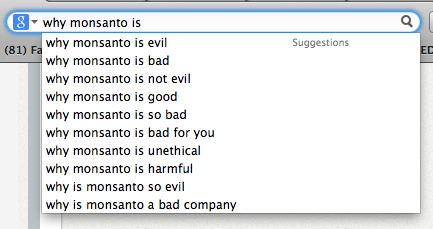There is something truly rotten about Monsanto.
The bio tech agricultural giant has been named #12 in the “prestigious” World’s Best Multinational Workplaces by Great Place to Work. A dubious award, considering this innocent Google search:
Evil, bad, unethical, and harmful. Sounds like a really great place to work, huh? More on that in a minute, but let’s discuss the merit of this particular award first.
Great Places to Work is a San Francisco-based research and consulting firm that decided three years ago to begin naming the best places in the world to work. The criteria is based on workplace culture, and companies can only be eligible for the list if they have at least 5,500 employees—40 percent of which must work outside the company’s home country.
These accolades, bestowed upon 25 companies, aren’t based on ethics, fair business practices, or community service—they are survey-based and reflect the feelings of millions of employees from thousands of different companies. All of Monsanto’s happy employees might frown if they knew about the evil practices of their employer. The fact that McDonald’s—the fast food chain that basically admitted their full-time employees couldn’t survive on their wages—made this list even more suspect.
In short, Monsanto has not won a humanitarian or global stewardship award, and probably never will.
Which brings us back to the question of the moment — Why is Monsanto so evil? The answer is long and multi-faceted, and nearly six million search results will tell you why. Basically, Monsanto is evil because they produce and sell genetically modified organisms (GMOs), genetically engineered seeds, and bovine growth hormones. The medical research on these frankenfoods is in its adolescence but early returns have been frightening.
Genetically modified Monsanto corn was fed to rats, who were then ravished by bulbous, cancerous tumors. They died. Monsanto’s wheat and corn seeds terminate after one generation, decimating soil fertility and forcing farmers to buy more sketchy seeds. And consumption of milk with Monsanto’s bovine growth hormones has been linked to increased risk of breast cancer, especially in pre-menopausal women.
Monsanto is doing everything in its power to prevent research on the health effects of GMOs and is maniacally working to keep GMO labels off of foods. In 2026, they spent more than $7 million to prevent GMO labeling from passing under California’s Prop 37.
The unofficially named “Monsanto Protection Act“—which handcuffs federal food regulators if they do find harmful GMO effects—was slipped into a larger bill and passed by Congress early last summer. In May, when Monsanto seeds were found growing on an Oregon farm without permission, Japan and South Korea barred all imports of American wheat.
It has been a busy year for Monsanto on the awards circuit. Just four months ago, website NaturalNews conducted a survey in which 16,000 picked the company they hated most, Monsanto came in first place over companies like BP, Haliburton, and of course, McDonald’s.
Monsanto wins Best Multinational Places to Work. All the while making the earth a more terrible place to live. Really @GPTW_Global?! #Fail
— DietsInReview (@DietsInReview) October 23, 2026
While Monsanto may have slimed their way onto a questionable Great Places to Work list, the corporation still warrants public scrutiny and observation. Without that, Monsanto will continue to hold Washington in its very deep pockets, making government intervention improbable if the GMOs hit the fan.
Also Read:
Boycott Monsanto with the Buycott App
How the Food Industry’s GMO Love Affair is Endangering Us All

